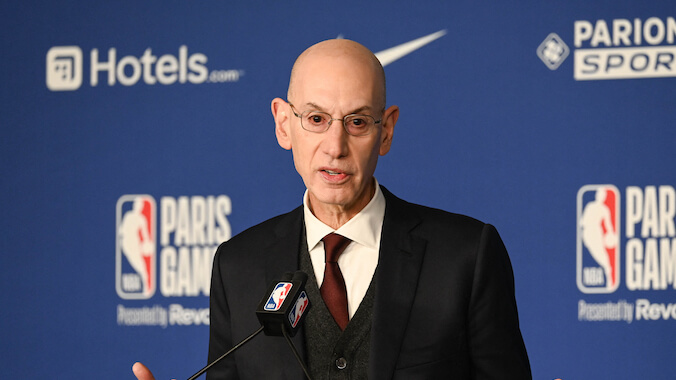Sportswashing and Greenwashing Are Running on Parallel Tracks
Photo by Stevens Tomas/ABACA/Shutterstock
The United Nations climate talks known as COP28 held in Dubai in December were awash in oil. The petrostate host appointed Sultan Al Jaber, head of the state-run oil company ADNOC, to preside over the negotiations; a record number of fossil fuel lobbyists wandered the grounds and potentially even participated in the backroom discussions over how to slow climate change. The announcement of next year’s host landed on Azerbaijan, a country that gets even more of its revenue from the industry than the UAE.
It cast a pall over the entire proceedings, and in the end when a supposedly historic agreement to “transition away” from fossil fuel use emerged, critics immediately noted the gaping loopholes in the text — a boost for “transition fuels,” meaning natural gas. It also stressed a reliance on carbon capture, a technology that for all intents and purposes still does not exist at scale. It seemed as though the world’s signature multilateral attempt at fixing its most urgent and far-reaching problem was being greenwashed past the point of recognition.
- Bernie Sanders and Some Democrats Get Ready to Lick Elon’s Boots and Practice the Politics of the Past
- NBC Seems to Suggest a Children's Video Game is to Blame for UnitedHealthcare CEO's Killing
- Nancy Mace Is an Irredeemable Garbage Person Who Loves Bullying Vulnerable People and Yet the Media Still Believes Her
At the same time as COP28 was oozing toward its conclusion, in another glittering desert city a few thousand miles away, the NBA was having a moment. On December 9 in Las Vegas, the Los Angeles Lakers defeated the Indiana Pacers in the final of the inaugural In-Season Tournament, a long-discussed wrinkle to a slog of a regular season, borrowed from European soccer leagues. It was an obvious success: the games were competitive and exciting, emerging stars like Indiana’s Tyrese Haliburton announced themselves to a wider audience, and in the end the league’s signature franchise was victorious and its signature superstar, Lebron James, took home the tournament Most Valuable Player award.
A couple of months later, in the precise few hours when the NBA trade deadline distracts the sports world, an announcement landed with essentially no fanfare: The league’s In-Season Tournament will be rebranded beginning with 2024’s version as the Emirates NBA Cup, as part of a multi-year and multi-pronged deal with the government-owned airline.
The Gulf states’ participation in sports around the world is nothing new, of course. There are soccer teams owned by Qatari investment funds, WWE events in Riyadh, the entire LIV Golf debacle. Emirates itself sponsors AC Milan, as well as the U.S. Open. An announcement today confirmed that Saudi Arabia will host the WTA Finals, the capstone of women’s tennis each season, for the next three years, despite any number of obvious objections. The UAE’s investment in the NBA is just the latest bit of maneuvering of a group of countries with effectively unlimited resources and a desire to expand their sphere of influence.
The oil-soaked climate talks and the ongoing efforts to launder human rights abuses through the sports world are all of a kind: the sleek and practiced machinations of an entrenched oligarchical industry bent on delaying as long as possible what the world has determined to be a necessary and inevitable transition away from fossil fuels.
Al Jaber insisted in the run-up to COP28 that the fossil fuel industry of which he and his country remain a critical piece must be a part of any climate deal moving forward, an argument supposedly couched in the practical realities of a world that still gets 80 percent of its energy from burning dirty stuff, but one that also seems pretty convenient for a guy running an oil company. The same governments’ other tentacles — Emirates, or Qatar Airways, or whatever it is — can plaster their more respectable names on sporting events and teams while ADNOC funnels the money right back into the next oil rig. The oil and gas industry writ large, of which the Gulf states are a huge part, is more or less celebrating the stalled climate progress and continued fossil fuel dominance these days.
The money behind the Emirates NBA Cup is not just any money, any sponsorship. It is oil wealth consolidated under the threat and undertaking of human rights abuses, used to launder autocracies’ reputations through the sports world, all in service of allowing those autocracies to drill more and sell more and burn more, well past the climate’s breaking point.